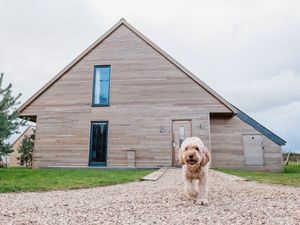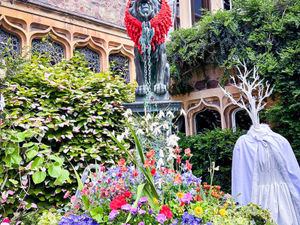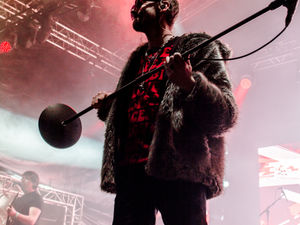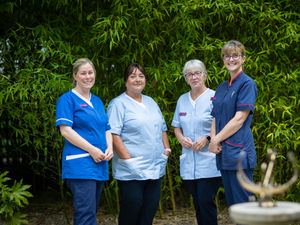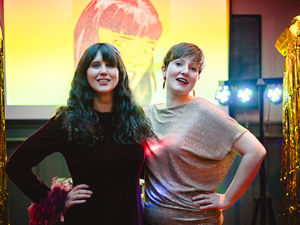You've having a laugh - comedy masterclass
There's nothing more enjoyable in the whole world than a good laugh. It's something that has brought people closer together for as long as we've existed. A giggle forms the basis of most of our social interactions – at the pub, at work, on dates.
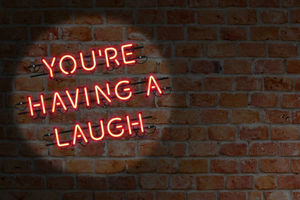
A GSOH (good sense of humour) is one of the most popular things that hopeful daters look for in potential partners, and last year, the 'crying with laughter' emoji became Oxford Dictionaries Word of the Year.
That's why stand-up comedy is still so popular – we all love a laugh. So when the opportunity to crack into comedy arose, Weekend writer Kirsty Bosley couldn't turn it down.
Over the last month, she's been attending workshops at Wolverhampton's Newhampton Arts Centre under the guidance of comedy headliner Janice Connolly (the brain behind Mrs Barbara Nice). Ahead of her stand-up debut, we've been on a fact-finding mission to discover everything there is to know about making it in the world of comedy performance.
We ask an up-and-comer, a full-time professional, a veteran and a club promoter about their experiences, and they give top tips on cracking comedy.
But even with all of this, can our Kirsty make a room full of strangers laugh?
The Comedy Cabaret takes place on March 11 at the Newhampton Arts Centre. For tickets, call 01902 572 090
Kirsty Bosley tells us how it's been:
It's just under two weeks now until I make my stand-up comedy debut and I'm still not funny. What am I going to do?
I've just sailed past What's The Worst That Can Happen Bay, and here in Oh My Life Swamp, my boat has overturned. If it wasn't for the life jacket that is our course leader Janice Connolly, I'd have drowned way before now.
As mentioned a few weeks ago when this new voyage began, I'm learning how to be a stand-up comedian at Wolverhampton's Newhampton Arts Centre. The NAC has a knack (ba-dum-tish) for finding great things to do in the community – if you've never been there before, then I'm about to present the perfect opportunity for you to go and give it a look. On Friday, March 11, at 7.30pm, me and the ladies I've been learning comedy alongside finally take to the stage and recite our much laboured-over material.
Oh God, oh God, oh God. . .
It's been a long journey, in many ways. Five three-hour sessions have made up our training, teaching us everything we need to know about crafting our techniques and honing our gags. Most people with a handful of dad jokes and a pocketful of witty comebacks think that comedy is easy – it isn't.
If there's one thing I've learnt in Janice's classes, it's that good comedy requires hard graft. Great stand-up flows easily from our favourite comedians. When you watch it, it looks natural, and that's part of the skill. That flow comes from hours and hours of practice.
Over the years, I have screamed with laughter over Peter Kay's observational quips, Victoria Wood's outstanding musical skits ('Not bleakly, not meekly, beat me on the bottom with a Woman's Weekly') and Russell Brand's lightning grasp of the English language.
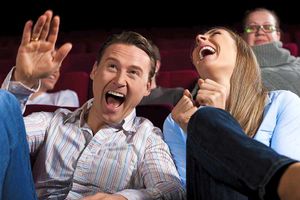
But each of those comedians is brilliant because they've somehow tapped into their own brand of irreplaceable, un-mimicable comedy.
Peter Kay is funny because his work looks so simple. His cheesecake and garlic bread remarks wouldn't be funny from anyone else's mouth. They're jokes you think you could have come up with yourself at home, only you didn't.
That's why people think that it's easy, writing comedy. It's far from it. When I'm sitting in front of a blank notepad just weeks away from my first gig, all I can think of are the jokes I wish I'd written. I've racked my brains to think of all the times my friends and family have laughed at me, and I can't think of a single, transferable gag.
Janice has been excellent. She's taught us so much, giving us the tools to find our funny and run with it. But material – a solid script of work – is only part of what it takes.
We spent one session getting comfortable handling a microphone. When she said we were to embark on such a task, I thought it seemed trivial. But when the first lady got up to the mic -– with the sole purpose of pulling it from the stand, introducing herself while moving the stand aside, before realigning it and replacing the mic, all while saying goodbye and keeping her eyes on the crowd – the challenge became obvious. Who would have thought such a simple thing could be so hard?
When it was time for me to do the same, I felt I'd handled things well to begin. But when I said 'thank you very much, goodnight!' the stand still wasn't in place and the mic was in my hand. I spent a few bumbling seconds putting the mic back where it belonged – bump, bump, bump. It looked stupid.
Nothing is very easy when you're standing in front of a bunch of strangers who have paid you to amuse them. Not handling the mic, not walking the stage, not looking them in the eye – nothing.
Janice is a great mentor. It's no surprise she's so great at comedy – she's reactive, interested and engages with the audience. After one particular session, I asked her for her top tips. She pondered, before replying: "Be yourself. Preparation is key. And don't ever blame the audience. . ."
The idea that if I bomb it's entirely my own doing makes me more nervous. Janice is meticulously going through our work with us to ensure that such a thing doesn't happen. She's done so much stand-up that she's well qualified to know what gets a laugh and what renders the crowd silent.
Throughout our classes, we've talked a lot. Janice has worked to coax us out of our shells and tap into what really makes us laugh. Then we've analysed it, broken it down to expose the anatomy of what makes it funny and we've taken the time to try and absorb the various techniques used by our favourite funny-men and women. Is it because the joke is controversial that we laugh? Because it's stupid and taps into something inherent? Because it's truthful? Or something else?
Every person in the class is different, and our comedy cabaret will be very dynamic. There are more than a dozen women taking part in the show, all with their own ideas of what's funny and their own ground on which to tread. There are political comedians, poking fun at the state of society. There are those who love quick, snappy gags, slamming home the punchline like Wladimir Klitschko. Some discuss cultural differences, the workplace, pets and pests.
And do you know what the strange thing is? We only need five minutes of material each to perform. All of this hard work and effort (I missed my stop on the train last week because I was embroiled in writing), for just five short minutes.
How much work must go into a 30-minute routine? Or an hour? I can't imagine how you'd go about memorising that many gags. Before this, I thought that stand-up comedy was a doss, a case of just getting up on stage and making people laugh. I had no clue.
The pressure is on to be funny, and Janice has promised that she won't let us get up there unless she's sure we'll at least get some laughs.
Before I began this journey, I thought I was at least semi-amusing. Now we've stripped it all back, I have no idea whether I'm funny at all. Only time will tell – I'll let you know how I get on!
Jim Smallman has been a comic since 2005, he offers his advice:
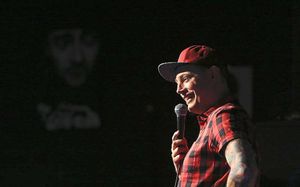
If you want to become a comedian, you'll have to work hard. Really hard. It takes a long time to earn any money, so be willing to work for nothing by doing open spots and short sets to gain experience. You'll have to drive alot!
When you're new, practice all the time. In the shower, in the car, whenever and wherever you can. And when you're first performing, no matter how nervous you are, slow down and make eye contact with the audience. Oh yeah, and listen to any advice established acts want to give you and watch as much stand-up as you can.
The biggest challenge you face as a comedian is managing expectations. Everyone wants to be on television, but only a few of us will manage to do that, or have arena tours and DVDs.
Once you realise that you can still make a good living out of comedy if you work hard and do the club circuit and stop paying attention to what everyone else is doing then you've cracked it.
It's just as much fun entertaining 200 people in a club as it is filming a panel show – I'd argue more fun – so I try to not focus on lofty goals, rather just being funny on a week-by-week basis.
The biggest no-no in comedy is stealing other people's stuff. Never, ever, ever tell another comedian's jokes. And besides, what's the fun in getting a laugh out of someone else's material when you could get a laugh out of something you've worked on yourself? Nobody has made it big in comedy by stealing.
Wayne Beese, who's been on the circuit for three years, offers his advice:
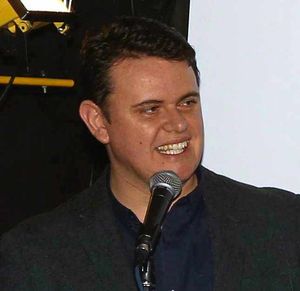
Stand-up comedy is the new rock'n'roll. Or so we're told. At the top end of the comedy circuit, where the likes of Michael McIntyre and Peter Kay can sell out the 20,000 O2 Arena in London, it's easy to see how the comparison can be made.
What people don't see – as these acts are packaged as overnight sensations who have arrived from nowhere – is the work it takes to get to the top of the tree.
Michael and Peter both put in the hard graft on the UK comedy circuit for 10 years and more before breaking into TV and becoming household names.
At the other end of the scale, it's far from glitz and glam.
I have been gigging as an aspiring stand-up comedian, jostling with thousands of other hopefuls up and down the country, for nearly three years.
Everyone, it seems at the moment, wants to have a crack at stand-up comedy.
The great majority don't last more than a year, once the harsh realities hit home.
There's very little – if any – money to be made when you start out.
I did 49 gigs in 2013 and was paid £136.50 – less than three quid per show. For more than 40 of those gigs I didn't receive a penny, slogging around the country doing 'open' spots in the hope of improving and catching the eye.
I dread to think how much it cost me in petrol, as you have to travel the length and breadth of the country honing your craft.
Last weekend, for instance, I drove more than 700 miles getting to and from three gigs.
Nearly 12 hours in a car – to do a grand total of 40 minutes on stage.
You're lucky in the early days if you get an audience of 16, let alone 20,000. And it will often be the case that the audience will be made up in the majority by fellow acts rather than genuine punters.
Or people who don't want to be an audience. People who are less than happy that some bright spark has thought it would be a good idea to stick a mic stand in the middle of 'their' busy town centre pub and try and put on a show, and who aren't afraid to tell you what they think.
You will find yourself signing up for a dreaded 'gong' show, where audience members can literally vote you off the stage before the end of your set if they don't like what they see and hear, because literally no-one else will give you a gig when you start out. King Gong, held at the Comedy Store in Manchester, is a particularly brutal experience. I can say that from personal experience after standing on that stage with nearly 400 people baying for blood and shouting 'off, off, off'. A 200-mile round trip for just over a minute on stage. And I still came in the top half of those who survived the longest!
But like any job, it's an apprenticeship, if a very lonely one at times.
And if you're prepared to put the work and the graft in, things get better.
I've done more than 200 gigs now. I've travelled as far as Plymouth in the south and Darlington in the north. I still love it. When an audience goes with you and laughs at something you've said or written there aren't many better feelings in life.
Of course when they don't, which happens to us all, there aren't many worse feelings. It's a real rollercoaster.
But I've performed in front of hundreds at The Glee Club, where I've now got my first proper paid spot later this year, as well as the famous Frog & Bucket club in Manchester.
I'm hosting my own show at Brierley Hill Civic Hall on July 16 where I'll be introducing Doc Brown, Kerry Godliman and the Fizzogs in front of up to 700 people.
Sure, it's still some way off 16,000. But I'll keep giving all I have to try and get there. One day. Maybe.
If not, I've still had an absolute blast trying. I haven't really got the hair for rock'n'roll anyway.
Jasper Carrot, veteran of the stage and screen, offers his advice:

I didn't work comedy clubs when I started out as they didn't exist.
I have been to many over the last 30 years and it is quite a competitive business.
You have to be brave, resilient and confident. The early stages are difficult until you have come across most situations that throw you and you have learnt to deal with them. To start with you will realise you are not very good, then there will come a stage when you think you're not great, but there seems to be nobody doing it as well as you, BINGO! you're on your way.
The biggest challenge to comedians is material. There are thousands of stand-ups and trying to make yourself different is the first challenge. If you are successful, particularly on TV, then the hard work really begins. Everyone is always looking for the next genius and they are always looking for what is good. Then when you have made it everyone starts looking for what's wrong.
Don't be afraid to seek help in writers, when you have spent five years on the circuit building up an hour or two's material and then you blow it all on TV, you 'aint gonna create genius in three weeks!
There are no big no-nos in comedy. Once you start censoring comedy, banning performance and silencing the spoken freedom of the clown, thereby lies subjugation on a massive scale. Be warned!
Adam Jeremko, a booker for comedy shows, offers his advice:

Comedians normally get in touch directly via email or if they have an agent they will email me and we go from there.
Normally they provide a video clip of them performing at least five minutes in a comedy club or pub and a little bit about themselves – how many gigs they've done and a biography. The introduction of our Comedy Carousel shows allow us to see more comedians, we feature three new acts doing five minutes each week. So all-in-all we see around 10 comedians a week across our four clubs.
If the comedians approaching us are terrible, which rarely happens, it will be a straight 'no' from us. But I feel everyone should get their chance so most get the opportunity to come and do at least five minutes.
After they've performed, we provide feedback and if they are good enough we will progress them. Five minutes on to 10 minutes to a paid 15-minute spot and then on to full paid 20-minute sets (the norm for comedy clubs). As we see so many comedians, they need to be really good.
Comedy is subjective but personally I feel likeability is first then jokes, lots and lots of jokes. If they like you, they will laugh, if you have jokes as well they will definitely laugh. Then it's just getting comfortable on stage, so loads of gigs will help. Our Friday and Saturday shows normally feature more mainstream stand-up rather than experimental, but you never know who will go down well. It's all about getting a line-up of four comedians that will make you laugh and think.
Having a safe line-up can get a bit predictable so we always try and feature more acts that are doing something different.
I love the ethos of the comedy circuit as stage time is the real currency over money, although that always helps.
Comedians can be going for two to three years plus doing free shows just to get their chance to move on to longer stage time. It really is an honest, passionate industry, and that comes from comedians and the venues.

